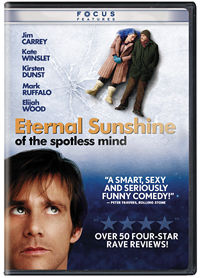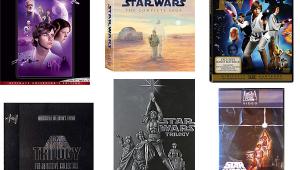Eternal Sunshine of the Spotless Mind
Picture ***
Sound ***
Film ****
How happy is the blameless vestal's lot!
The world forgetting, by the world forgot.
Eternal sunshine of the spotless mind!
Each pray'r accepted, and each wish resign'd.
 So Alexander Pope writes in "Eloisa to Abelard," a poem that may sound familiar to English majors, or to fans of Charlie Kaufman's screenplays—this is the second time Kaufman has referenced it in a film. If you've seen the mind-bending Being John Malkovich, you'll remember John Cusack, who plays a puppeteer in that film, performing a puppet show to this text on the streets of New York. In Pope's poem, a nun, Eloisa, is torn between her vows to God and her love for a man, Abelard. The poem is an epic struggle between religion and the pleasures of the flesh, and a tribute to such dysfunctional relationships as are found in Eternal Sunshine of the Spotless Mind.
So Alexander Pope writes in "Eloisa to Abelard," a poem that may sound familiar to English majors, or to fans of Charlie Kaufman's screenplays—this is the second time Kaufman has referenced it in a film. If you've seen the mind-bending Being John Malkovich, you'll remember John Cusack, who plays a puppeteer in that film, performing a puppet show to this text on the streets of New York. In Pope's poem, a nun, Eloisa, is torn between her vows to God and her love for a man, Abelard. The poem is an epic struggle between religion and the pleasures of the flesh, and a tribute to such dysfunctional relationships as are found in Eternal Sunshine of the Spotless Mind.
In this film, Joel Barish (Jim Carrey) is a man imprisoned, much as Eloisa was by religion, by his inability to communicate with those he loves. Joel meets the open-minded Clementine (Kate Winslet), who is anything but shy, and of course falls in love with her. ("Why do I fall in love with every woman who shows me any attention?" Joel asks himself.) Clementine and Joel break up after a nasty fight, and she, on a whim, decides to have his memory erased from her mind by Lacuna Inc., a firm that specializes in such tasks. The next time Joel sees Clementine, she ignores him, and already has a new boyfriend. In pain and retaliation, Joel decides to have her memory erased from his own brain. But, as he's going through the process, he realizes he doesn't want to let go of these memories, even if he has to let go of her. As he relives each memory, he tries to outrun the erasers, taking his memories of Clementine with him to other parts of his mind to "hide" from Lacuna.

This is Charlie Kaufman's best screenplay yet. His popular theme of tragic love is utterly sweet here, as Joel takes Clementine with him through the deepest, darkest parts of his brain. In a stroke of genius, Kaufman shows us how, though Joel could not verbally share with Clementine any important part of his "not very interesting" life, he allows her to experience with him the pain, humiliation, and intimacy of his most important memories. Memories, after all, can never really be shared, only explained. But Joel does share with Clementine his bad memories so that he won't lose his good memories of her—an interesting paradox.
While I've never been a huge fan of Jim Carrey, this film proved to me how versatile he is. Here he is quiet, and his face is, to my relief, relatively unexpressive. I'd even go so far as to say that his performance is poetic. Winslet is tumultuous as Clementine; Kaufman has an uncanny ability to create realistic female characters that are both flawed and beautiful (Meryl Streep in Adaptation, Catherine Keener and Cameron Diaz in Being John Malkovich).
 The DVD comes with a bunch of cool extras, such as "A Look Inside Eternal Sunshine of the Spotless Mind," a behind-the-scenes feature, a conversation with Jim Carrey and director Michel Gondry about their favorite moments in the film, a feature commentary by Gondry and Kaufman, deleted scenes that are a bit boring, and a music video by Polyphonic Spree.
The DVD comes with a bunch of cool extras, such as "A Look Inside Eternal Sunshine of the Spotless Mind," a behind-the-scenes feature, a conversation with Jim Carrey and director Michel Gondry about their favorite moments in the film, a feature commentary by Gondry and Kaufman, deleted scenes that are a bit boring, and a music video by Polyphonic Spree.
The sound is good, with some excellent surround effects and editing, especially when it comes to the voices heard "outside" Joel's head as his memories are erased. The video is also very sharp, with lots of saturation and bright colors, such as Clementine's various hair tints of tangerine, blue, and green.
Eternal Sunshine of the Spotless Mind grows more poignant with each viewing, as you catch things you didn't the first few times. It's Charlie Kaufman's shining moment.—KR






























































